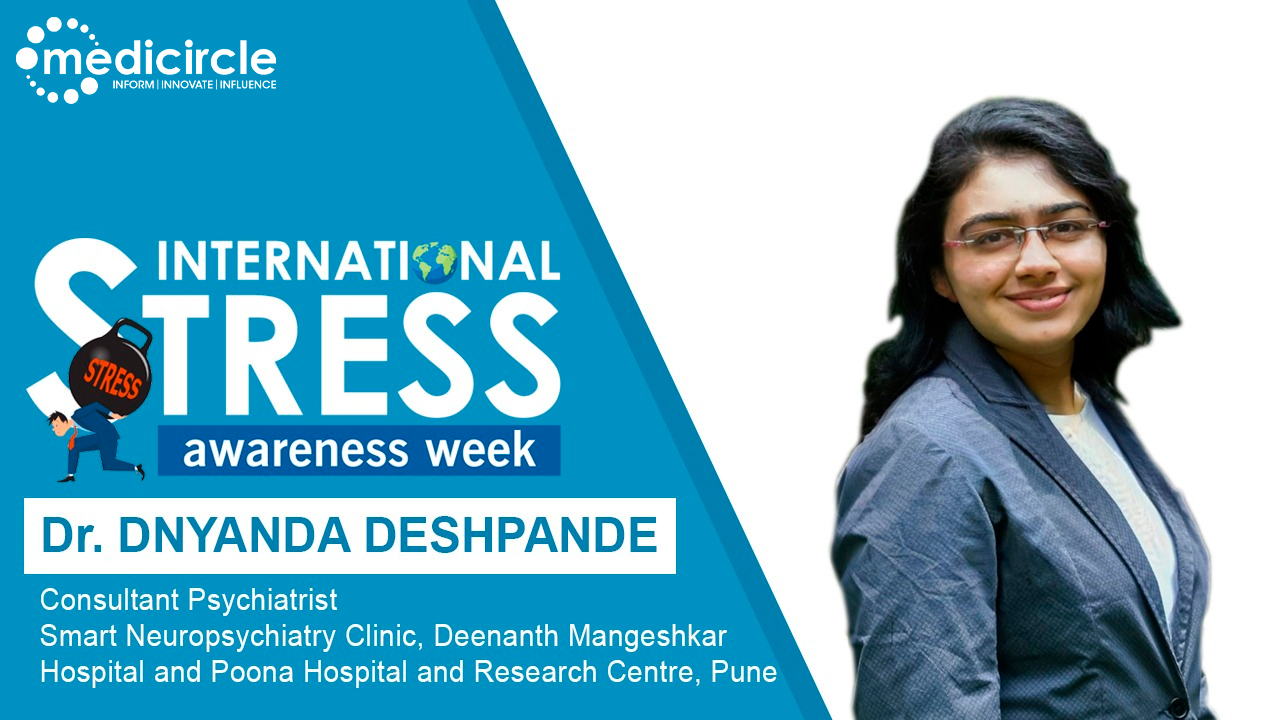The feeling of being overwhelmed or unable to cope with mental and emotional pressure is stress. Stress is our body’s response to pressure. Many different situations or life events can cause stress. Sometimes, this stress response can be useful: it can help us push through fear or pain. However, too much stress can cause negative effects. Long term, this can affect our physical and mental health.
As per the result of a large-scale survey conducted across India in 2019, young adults between the age of 20 and 29 years of both genders were the most stressed in the country. The major cause of high-level stress among young people are peer pressure, pressure to succeed in academics or work, and irregular routines. 50% of Indian professionals have reported that an uncertain future is their topmost source of stress as was revealed in a recently concluded survey by The7thFold, a boutique HR and Wellbeing firm.
Every year, the world celebrates International Stress Awareness Week from 1st to 5th November. The day encourages people to sit back, unwind and embrace peace. Awareness about this become even more significant this year due to the tough times people across the world have gone through in the COVID-19 outbreak. We at Medicircle are conducting the International Stress Awareness Week Series wherein we will be featuring experts in this field to understand and create more awareness about the effects of stress.
Dr. Dnyanda Deshpande is a practicing Consultant psychiatrist at Smart Neuropsychiatry Clinic, Deccan, Pune. She is a consultant at renowned Deenanth Mangeshkar Hospital and Poona Hospital and research center, Pune. Her special interests are to explore critical, spiritual, and philosophical perspectives in psychiatry. She is a member of the Indian Psychiatric society. She has been actively involved in initiatives to educate medical, psychology interns, and trainees on the intersection of psychology and psychiatry. She is a member of the American association of eating disorders, working on psychological aspects of obesity in children and adolescents in India.
What is Stress?
Dr. Deshpande begins, “In simple words, stress is the physical and emotional reaction created by our body and brain to any kind of change. Different neurochemicals are involved and different physical responses are created. These reactions can be both positive and negative.”
Common causes of stress
Dr. Deshpande says, “I have specialized in the section of Children and Adolescent, so such young adults have different reasons for stress. Some causes are due to physical and mental illnesses, relationship challenges in a personal and professional setup, and academic pressure. Due to online schooling, many are living sedentary lifestyles. Many such children also suffer due to their eating habits and obesity.”
When does one need professional help?
Dr. Deshpande explains, “Change is inevitable. The reaction to any change is stress. So everyone will undergo stress. The answer to when to seek professional help is when you notice alarming signs in your life or when some or all aspects of your life get affected. If your physical or mental health or your relationships or work is getting affected then professional help is needed.”
“Repeated conflicts or cognitive disturbances in terms of lack of concentration, declining performance, absenteeism, withdrawal or social isolation can be seen. The strategies used by an individual to deal with stress are called coping mechanisms. One can get into negative elements, like smoking, tobacco, or alcohol.”
“Chronic stress often converts into physical diseases like hypertension, insomnia, diabetes, PCOS, migraines, and obesity. If you notice such signs in your life, then do reach out to an expert.”
Type Professional Help Available
Dr. Deshpande mentions, “From simple stress counseling to pharmacotherapy, there are multiple ways one can get professional help. A person can take single session therapy or they can go for supportive counseling. Prolonged cognitive therapy or rational emotive therapy will teach coping strategies and suggest behavioral changes.”
“Then there are certain mental conditions where due to stress some can have anxiety or mood disturbances, PTSD or acute stress reactions. These can be treated by using psychiatric medicines.”
Stress and Obesity
Dr Deshpande elaborates, “Eating is the response to stress not only for kids but for adults as well. In prehistoric times, stress for man was nothing but hunger. If the stone age man faced any disaster or calamity, they would run low on food. So the way they dealt with was to consume food and store energy in the body.”
“When we are under stress our body releases cortisol the stress hormone. Cortisol converts everything into fat. This is why stress-eating is very common. We gravitate towards fatty-salty-sugary foods. Whatever we eat then converts into fat which leads to obesity.”
How to help the child avoid stress-eating?
Dr. Deshpande suggests, “Parents should first look into the causes of the behavior. What is the cause of the child’s stress? Is it peer pressure or academics? If needed, the family should consult a therapist or counselor. The family should let the child know that eating is for energy and one should not eat to cope up with one’s emotions.”
Lifestyle Habits To Avoid Stress
Dr. Deshpande recommends, “In the physical domain, one must maintain an active lifestyle, engage in exercise and yoga, maintain a healthy diet. Add omega 3 fatty acids, nuts, high-quality protein, and chocolate to your diet.”
“In the behavioral domain, we need to increase our socialization and sources of happiness. Have healthy family, professional and social relationships. Better your thinking pattern. Use professional help or self-help books to develop good thinking patterns.”
(Edited by Priyal Shah)

 Many have the habit of binge-eating while under stress. Learn the psychological reason behind stress eating and how this coping habit can lead to obesity.
Many have the habit of binge-eating while under stress. Learn the psychological reason behind stress eating and how this coping habit can lead to obesity. 









.jpeg)








.png)
.png)

.png)
.png)
.png)

.png)
.png)
.png)

.png)
.png)